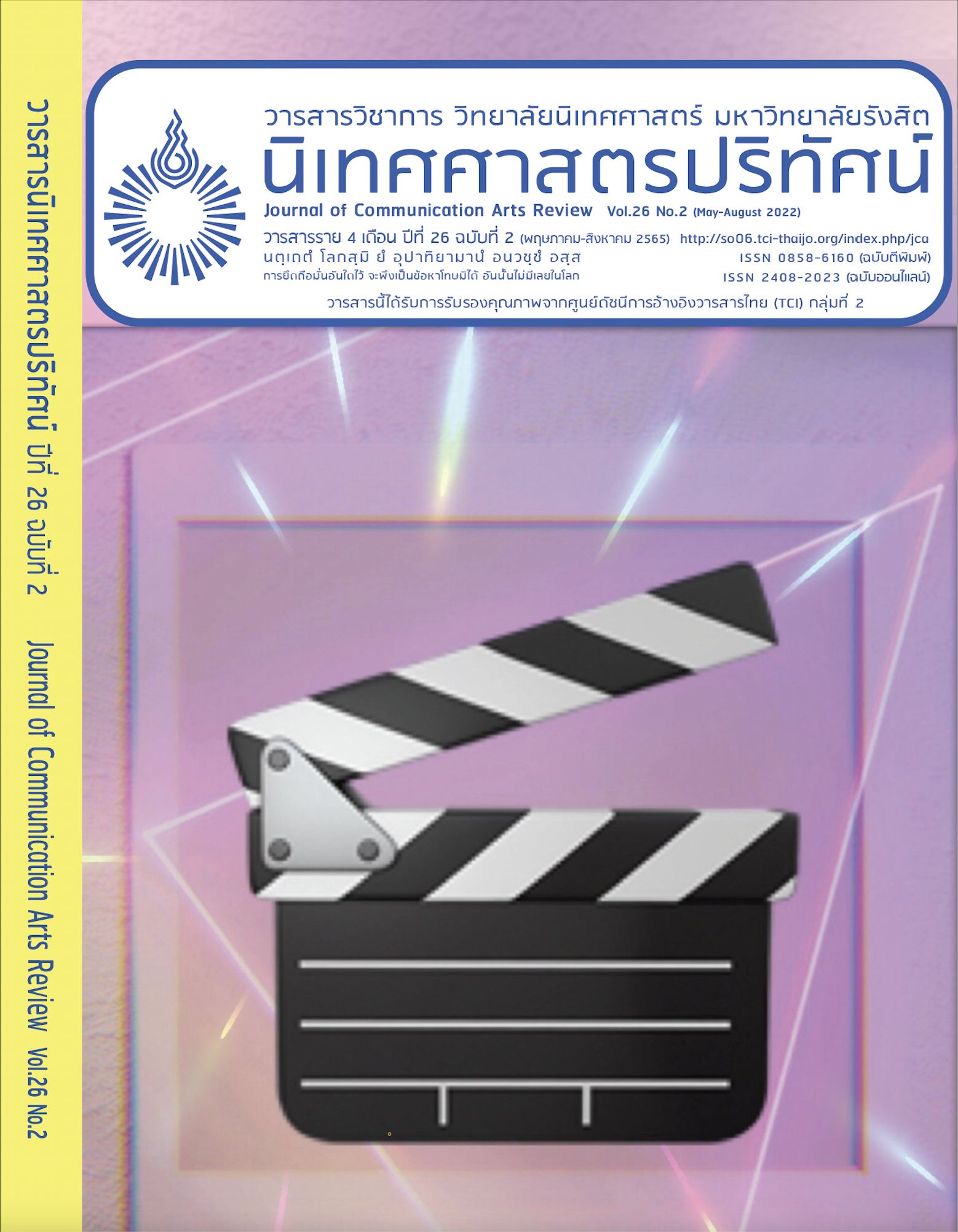Problems of Online Communication : re-assessing mobile phone usage among young people during the COVID pandemic in Thailand and other countries.
คำสำคัญ:
การใช้มือถือของนักเรียน, ปัญหาการเสพติดโทรศัพท์มือถือ, ความรู้ทางเทคโนโลยีบทคัดย่อ
แม้ว่าผู้เกี่ยวข้องกับการสื่อสารส่วนใหญ่จะเห็นพร้องต้องกันว่า การใช้โทรศัพท์มือถือของเด็กเล็กโดยเฉพาะนักเรียนชั้นประถมควรมีการใช้อย่างจำกัด แต่เนื่องจากการระบาดของโรคโควิด-19 ที่ได้ก่อให้เกิดเงื่อนไขใหม่ในการติดต่อสื่อสาร ส่งผลให้การสื่อสารผ่านสื่อดิจิทัลได้รับการสนับสนุนและส่งเสริมเป็นอย่างมากเพื่อช่วยลดการแพร่กระจายของโรค จากสถานการณ์โรคระบาดนี้ องค์กรหรือหน่วยงานต่าง ๆ ได้กำหนดและเสนอแนวทางในการปฏิบัติซึ่งเป็นประโยชน์ที่เกี่ยวข้องกับการใช้โทรศัพท์มือถืออยู่หลายประการ อาทิ (ก) ส่งเสริมให้มีการใช้อุปกรณ์เคลื่อนที่ (ทั้งในสถานศึกษาและที่บ้าน) อย่างมีความรับผิดชอบและควรพิจารณาในการเลือกรับข่าวสารให้มากขึ้น (ข) ลดการถูกรบกวนและลดการเสียเวลา (ค) ส่งเสริมให้มีการติดต่อสื่อสารทางเครือข่ายสังคมออนไลน์โดยตรง; และ (ง) เพื่อสามารถใช้ประโยชน์จากโทรศัพท์มือถือในการสื่อสารทางไกลและการเข้าถึงข้อมูลข่าวสารที่จำเป็น เพื่อให้การเรียนรู้สำเร็จไปได้ด้วยดี
อย่างไรด็ตาม ได้มีการอภิปรายแสดงความคิดเห็นเกี่ยวกับผลกระทบของการใช้อุปกรณ์ดิจิทัลในการเรียนการสอนกันอย่างกว้างขวางขึ้นเรื่อย ๆ โดยเฉพาะอย่างยิ่งประเด็นการใช้โทรศัพท์มือถือในขณะกำลังเรียนของนักเรียน ท่ามกลางความกังวลนักการศึกษาเกี่ยวกับมาตรฐานของการรู้หนังสือและการคำนวณ ซึ่งนักการศึกษาหลายจากประเทศได้ระบุถึงปัญหาต่าง ๆ ได้แก่ ความใจลอยฟุ้งซ่าน/ การถูกขัดจังหวะหรือรบกวนการสอน / การขาดสมาธิ/ การถูกกลั่นแกล้งในโลกไซเบอร์ รวมทั้งปัญหาด้านสุขภาพต่าง ๆ ว่าล้วนเป็นผลที่เกี่ยวข้องมาจากมาจากการใช้โทรศัพท์มือถือในโรงเรียน บทความนี้จึงแสดงข้อมูล ความคิดเห็นและสรุปให้เห็นถึงผลกระทบของการใช้โทรศัพท์ในชั้นเรียน อีกทั้งการนำเสนอแนวทางซึ่งได้จัดทำขึ้นในรูปแบบแผนกลยุทธ์ เพื่อบรรเทาปัญหาดังกล่าวในสภาพแวดล้อมการศึกษาแบบดั้งเดิม
เอกสารอ้างอิง
Australian Associated Press. (2019) Call for national mobile phone ban in public schools to face resistance. https://www.theguardian.com/australia-news/2019/jun/28/call-for-national-mobile-phone-in-public-schools-to-face-resistance. Accessed 4 July 2019
Bennet, A. and Bennet, D. (2008) The depth of knowledge: surface, shallow or deep. VINE Journal of Information and Knowledge Management, 38 (4): 405 – 420.
Bilmanoch, S. (2007) The role of New Communication Technologies in influencing socio-cultural change or values in Thailand. Journal of Communication Arts (Chulalongkorn University), 25 (3): 91 – 116.
Boumosleh, J. and Jaalouk, D. (2018) Smartphone addiction among university students and its relationship with academic performance. Global Journal of Health Science, 10 (1): 48 – 60. doi: 10.5539/gjhs.v10n1p48.
Chae, S-G. (2020) A survey on the use of mobile phones due to COVID-19. International Journal of Internet, Broadcasting and Communication, 12 (3): 233 – 243. http://dx.doi.org/10.7236/IJIBC.2020.12.3.233.
Clayton, R.B., Leshner, G. and Almond, A. (2015) The extended iSelf: the impact of iphone separation on cognition, emotion, and physiology. Journal of Computer-Mediated Communication, 20 (2): 119 – 135.
Elhai, J.D., Dvorak, R.D., Levine, J.C. and Hall B.J. (2017) Problematic smartphone use: a conceptual overview and systematic review of relations with anxiety and depression psychopathology. Journal of Affective Disorders, 207:251 – 259. Epub 2016/10/14. pmid:27736736.
Kawasaki, N., Tanei, S., Ogata, F., Burapadaja, S., Loetkham, C., Nakamura, T. and Tanada, S. (2006) Survey on cellular phone usage on students in Thailand. Journal of Physiological Anthropology, 25 (6): 377 – 382. pmid: 17213690. doi: 10.2114/jpa2.25.377.
Khalil, S. (2019) Students at Victorian public schools will be banned from using their phones from next year. https://www.news.com.au/lifestyle/parenting/school-life/students-at-victorian-public-schools-will-be-banned-from-using-their-phones-from-next-year/news-story/ Accessed 4 July 2019
Khidhir, S. (2019) Smartphones causing Thai youths pain. https://theaseanpost.com/article/smartphones-causing-thai-youths-pain Accessed 17 January 2022
King, A.L., Valenca, A.M. and Nardi, A.E. (2010) Nomophobia: the mobile phone in panic disorder with agoraphobia: reducing phobias or worsening of dependence? Cognitive and Behavioral Neurology, 23 (1): 52 – 54. Epub 2010/03/20. pmid:20299865.
Lee, S., Kim, M., Mendoza, J.S. and McDonough, I.M. (2018) Addicted to cellphones: exploring the psychometric properties between the nomophobia questionnaire and obsessiveness in college students. Heliyon, 4 (11):e00895. Epub 2015/11/15. pmid:30426100; PubMed Central PMCID: PMCPmc6223106.
Mettathamrong, J. (2021) Factors that affect the behavior of adolescents in Thailand due to the use of mobile phones in their daily life. Utopia y Praxis Latinoamericana, 26 (2): 212 – 226.
Misra, S., Cheng, L., Genevie, J. and Yuan, M. (2014) The iPhone Effect: the quality of in-person social interactions in the presence of mobile devices. Environment and Behavior, 48 (2): 275 – 298.
Nguyen, M. H., Gruber, J. and Fuchs, J. (2020) Changes in digital communication during the COVID-19 global pandemic: implications for digital inequality and future research. Social Media and Society, July-September 2020: 1 – 6. doi: 10.1177/2056305120948255.
Pacharapha, T. and Ractham, V. (2012) Knowledge acquisition: the roles of perceived value of knowledge content and source. Journal of Knowledge Management, 16 (5): 724 – 739.
Pritchard, D., Millar, A. and Haddok, A. (2010) The Nature and Value of Knowledge: Three Investigations. Oxford University Press, UK.
Rotondi, V., Stanca, L. and Tomasuolo, M. (2017) Connecting alone: smartphone use, quality of social interactions and well-being. Journal of Economic Psychology, 63: 17 – 26. https://doi.org/10.1016/j.joep.2017.09.001
Selwyn, N. (2019a) Banning mobile phones in schools not a clear-cut solution. https://www.abc.net.au/2019-06-26/banning-mobile-phones-in-schools-not-clear-cut-solution/11248876. Accessed 4 July 2019
Selwyn, N. (2019b) Banning mobile phones in schools: beneficial or risky? Here’s what the evidence says. https://theconveration.com/banning-mobile-phones-in-schools-beneficial-or-risky-heres-what-the-evidence-says-119456. Accessed 4 July 2019
Tangmunkongvorakul, A., Musumari, P.M., Thongpibul, K., Srithanaviboonchai, K., Techasrivichien, T., Suguimoto, S.P., Ono-Kihara, M. and Kihara, M. (2019) Association of excessive smartphone use with psychological well-being among university students in Chiang Mai, Thailand. PLoS ONE, 14 (1): e0210294. https://doi.org/10.1371/journal.pone.0210294
Tanney, J. (2013) Rules, Reason, and Self-Knowledge. Harvard University Press, Cambridge, MA.
University of Texas at Austin (UT Austin) (2017) The mere presence of your smartphone reduces brain power, study shows. ScienceDaily, 23 June 2017. www.sciencedaily.com/releases/2017/06/170623133039.htm Accessed 3 February 2022.
Watson, J. (2020) Knowledge erosion and degradation: a single case-study of knowledge risks and barriers in a multi-business organisation. PhD thesis, Victoria University, Melbourne. 738 pp.
ดาวน์โหลด
เผยแพร่แล้ว
ฉบับ
ประเภทบทความ
สัญญาอนุญาต
ลิขสิทธิ์ (c) 2022 วารสารนิเทศศาสตรปริทัศน์

อนุญาตภายใต้เงื่อนไข Creative Commons Attribution-NonCommercial-NoDerivatives 4.0 International License.


